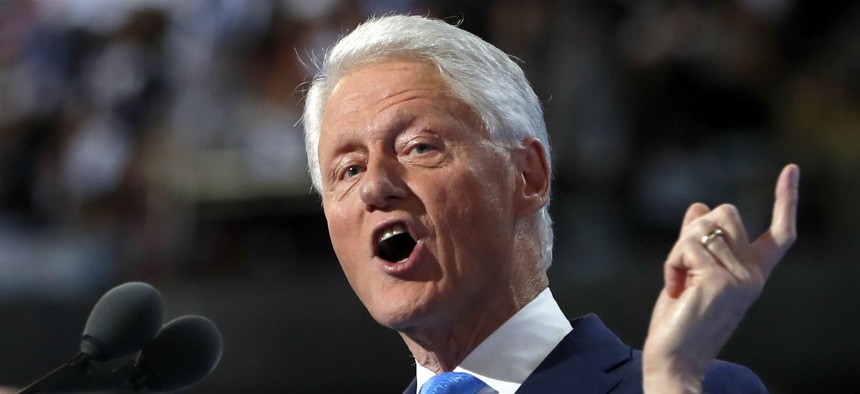Bill Clinton Tries to Humanize His Wife With a Political Love Story
He relies on nostalgia to portray her as an agent of change, not a card-carrying member of the Washington establishment.
PHILADELPHIA—History was made here Tuesday, with Hillary Clinton breaking the proverbial glass ceiling to become the first woman presidential nominee in American history. But it was Bill Clinton’s closing convention speech that stole the show.
He made the kind of case for Hillary Clinton that only he could, offering a self-deprecating reminiscence of their courtship in college, her work as an aspiring civil rights activist, and her devotion as a mother. His goal was to portray his wife as an agent of change even though she’s as established and experienced as any politician in Washington.
The big question was whether Hillary Clinton, whose favorability ratings are at dismal levels, could be humanized by one 45-minute speech from her husband. And would the sanitized, PG-rated story of the Clinton marriage really persuade undecided voters, especially those familiar with Bill Clinton’s publicized adulteries?
Bill Clinton’s argument relied on professional accomplishments from her distant past. “She did more positive change-making before she was 30 than most do in a lifetime in office,” he said. He dwelled on her college years and early career, while glancing over her decades in public life as a secretary of State, senator, and first lady. At a time when voters can’t stop thinking about tomorrow, making the case for Clinton’s early years instead of her recent record in public office only underscored how retro her candidacy is.
Clinton also dared his listeners to choose which version of reality they believed—the fairy-tale marriage that he outlined, or the story of a corrupt, incompetent secretary of State that Republicans told at their convention. “How does this square with what you heard at the Republican National Convention? One is real. The other is made up,” he said. The truth is that neither reflects reality.
I expected Bill Clinton to make a stronger case for Hillary Clinton’s record in political life, beyond the rushed and scattershot examples he offered. The speech was more notable for what he didn’t say than what he did. He didn’t talk about how she would govern. He barely mentioned her credentials on national security. He didn’t defend her from the GOP’s strident attacks about her support for regime change in Libya and handling of the Benghazi attacks.
That wasn’t his goal Tuesday night. Unlike his effective 2012 convention speech making the case for President Obama’s record, he took a more personal touch for his wife. He figured it would more effective to speak to Hillary Clinton’s character, while Obama—her boss—vouches for her record when he speaks at the convention Wednesday.
But if voters are going to buy the virtuous gloss Bill Clinton put on his wife, they will have to overlook charges of financial chicanery at the Clinton Foundation, as well as the scandal over her private email server and her many evasions in defending it. As always, relying on a Clinton to make the case for character will be a dicey proposition.




